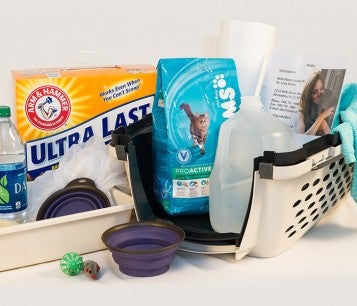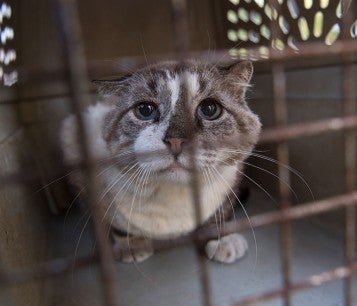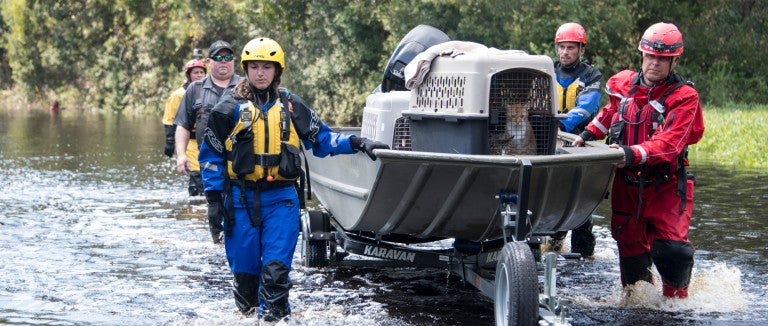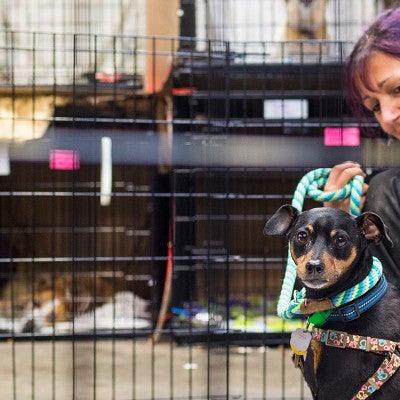How we help
- What does the HSUS do to help during disasters? Can the HSUS help a particular city or area?
- Can you stop shelters euthanizing animals in the disaster area?
- I see livestock in a field who may drown. Can the HSUS help?
- Are you going to place animals left behind during a disaster in better homes?
- What percentage of donations to the Emergency Animal Relief Fund goes toward disaster relief?
How you can help
- What should I do to keep my animals safe during a disaster?
- Why do people leave their pets behind?
- What should I do if I find a lost pet? Where can I find my lost pet?
- My shelter can take animals. How can we help?
- Should I travel to the disaster area to help?
- How can I help local animal shelters?
- How can I support the Humane Society of the United States' efforts to help animals impacted by disasters?
Use our checklist to assemble an emergency kit for yourself and all your pets. During disasters, creating an emergency plan can be a lifesaver.

How we help
What does the Humane Society of the United States do to help during disasters? Can the HSUS help a particular city or area?
Legally, we can only respond when we receive requests from official agencies for field response or from shelters affected by the event. When we do receive a request, our trained and certified Animal Rescue Team deploys to rescue stranded animals, make room and resources available for displaced pets by transporting out existing, adoptable animals from shelters, and help agencies establish emergency shelters on site. Pre- or post-disaster, our team can provide grants and disaster preparedness training.
For an out-of-state organization to assist in a federal disaster area, there must be an official request from the appropriate agency or emergency official. If a group or agency needs help, we ask that they contact their local emergency officials, who—if assistance is needed—will get the request to us. These protocols are in place to ensure there is not chaos created by outside groups coming in unrequested, and to ensure the assistance is sent to where it is needed most.
Can you stop shelters euthanizing animals in the disaster area?
During times of disaster, many rumors and misleading information make their way onto the internet. Generally, shelters do not euthanize animals in advance to make space for disaster animals, as most shelters are committed to providing the best care and outcome for their animals.
The HSUS is committed to ending the euthanasia of healthy and treatable pets. Through our Shelter and Rescue Partners program, we work with organizations who need additional assistance and resources, whether through training, supporting transport efforts or meeting other needs. We encourage any organization with needs to reach out to their local emergency management officials to request assistance.
I see livestock in a field who may drown. Can the HSUS help?
We each have a duty to ensure that all animals in our care do not suffer or become harmed in a storm. We urge everyone to make a disaster preparedness plan for all animals they are responsible for, whether they are pets, farm animals or other animals in their care. Legally, for the HSUS to assist during disasters, an official request must be made from the appropriate agency.
Are you going to place animals who someone left behind during a disaster in better homes?
Our role in disaster responses is to help animals in need and to keep families together. If we participate in a rescue in which an animal is suffering because of intentional cruelty, we would refer that case to law enforcement for further investigation and potential legal action if warranted, but in the vast majority of cases, our role is to reunite families.
We always encourage people to evacuate with their pets, but we recognize that bringing pets along is not always possible for a variety of reasons. It’s not our place to pass judgment in those situations and we do not have the authority to seize animals. Our job is to help animals and people recover from the trauma that they have suffered. The animals we transport out of state to our Shelter and Rescue Partners are animals who were up for adoption prior to the disaster or post-disaster after the official stray hold time has been completed to allow families to find and reunite with their pets.
What percentage of donations to the Emergency Animal Relief Fund goes toward disaster relief?
One hundred percent of donations made to our Emergency Animal Relief Fund are used for our preparedness, rescue and relief efforts for disasters and large-scale cruelty and neglect cases, which we consider disasters. This includes animal care; deploying resources; increasing the infrastructure and capacity of our emergency response efforts through fundraising and education; transporting animals from affected areas; and supporting shelters and rescues receiving animals. Our priority is to use donations in the most effective and efficient way so we are always ready to help animals.
We never know where disasters will strike or when animals may be in need of urgent rescue, but we know we must be ready. Your support makes this lifesaving work possible.

How you can help
What should I do to keep my animals safe during a disaster?
Learn about pet disaster preparedness.
Why do people leave their pets behind?
For all pet owners, leaving a beloved pet behind when evacuating for disaster is a tragedy. Pets get left behind for a multitude of reasons: A disaster can happen when no one is home, and safety restrictions often prevent people from returning to collect their pets. Those who can access their pets may not have sufficient transportation for their pets or may need to stay in emergency shelters or hotels that do not accept pets. Terrified pets may run away during disasters or exit damaged homes and get lost. That’s why we implore people to make a pet disaster preparedness plan before disaster strikes.
What should I do if I find a lost pet? Where can I find my lost pet?
Take any animal found in a disaster zone to the most local animal control agency or emergency shelter for disaster-impacted animals. Transporting an animal across city or state lines will make it much harder for families to reunite with their pets.
If you have lost a pet, provide a photo of your pet, your name and your contact information to local animal control agencies, shelters and rescues. Know that these organizations are likely overwhelmed and taking in newfound pets daily, so be proactive and check each day to see if your pet is among the most recent intakes.
My shelter can take animals. How can we help?
Only adoptable animals in disaster-impacted shelters are immediately available for transport. All disaster animals are held to give their families time to find their pets. Shelters outside of impacted areas able to transport or take in adoptable animals are encouraged to reach out and let those in need know you can help.
Should I travel to the disaster area to help?
Beyond trained responders who were directly contacted, it is imperative that no one goes to the area on their own or self-deploys. We won't be able to use volunteers who haven't gone through official training. If people who self-deploy come and get stranded, emergency response attention must then add them to the long list of rescues and divert attention away from the existing priority rescue work. It is simply too dangerous and may result in lost/stray animals not going through the official systems to ensure they are reunited with owners.
Our Animal Rescue Team is made up of full-time staff and reserve staff that works on a contract basis. Team members have a variety of backgrounds, including backgrounds in local animal services. You can apply to volunteer or keep an eye on our Careers page for open positions.
How can I help local animal shelters?
Donate money, gift cards and/or supplies to impacted shelters and those that are taking in animals. Check with those organizations before sending supplies to make sure what you want to send is helpful; many shelters will share lists of their priority needs on their websites or social media accounts. You can also reach out to our Shelter and Rescue Partners near you to see if foster families are needed for displaced pets.
How can I support the Humane Society of the United States' efforts to help animals impacted by disasters?
Please support rescue and relief efforts by donating to our Emergency Animal Relief Fund. Your gift will ensure that our team can continue to answer the call during times of emergency wherever and whenever animals need us.

